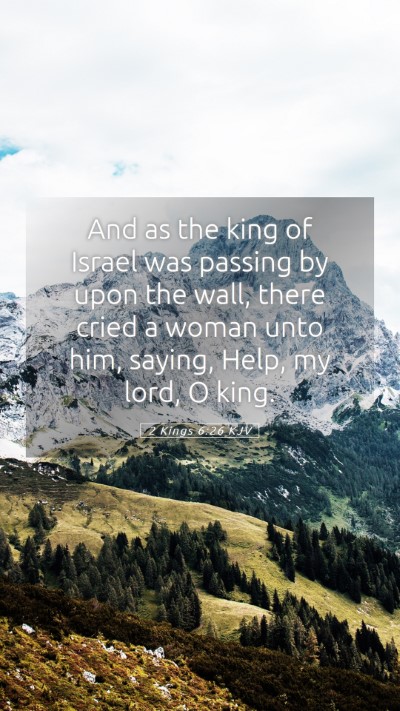Bible Verse Commentary: 2 Kings 6:26
Verse: "And as the king of Israel was passing by upon the wall, there cried a woman unto him, saying, Help, my lord, O king!"
Understanding Scripture: Overview of 2 Kings 6:26
This verse occurs in a dire historical context during the siege of Samaria. The verse illustrates the extreme conditions that the people faced, highlighting their desperation and the breakdown of social order amidst a famine so severe that it led to unimaginable acts of hopelessness.
Context and Background
The narrative takes place within the broader context of Israel’s conflicts with Syria. A severe famine has struck Samaria, leading to great suffering. The king's helplessness is accentuated as he listens to the plea of a woman who represents the suffering Israelites. This moment reveals the futility of human leadership without divine guidance and the despair felt by people in times of crisis.
Insights from Commentaries
- Matthew Henry: He notes that the king's position, even as he walks on the wall of the city, symbolizes the high expectations of leadership during crises. The woman’s cry for help demonstrates the unbearable burden the people carry and their longing for relief.
- Albert Barnes: Barnes emphasizes the king's inability to assist, reflecting on the despair that leads individuals to seek help from earthly rulers when true aid comes only from God. This verse presents a poignant picture of human helplessness.
- Adam Clarke: Clarke focuses on the social implications of such a famine, mentioning that this scenario foreshadows the moral degradation facing Israel. The haunting plea for help signifies profound social distress and loss of faith, as the king is depicted as powerless in meeting the needs of his people.
Key Themes in 2 Kings 6:26
- Desperation: The plea for help illustrates the extreme suffering during the siege, emphasizing how famine drives people to seek aid in desperate times.
- Leadership Accountability: The king’s inability to help reflects the burden of leadership, especially in crisis situations, and raises questions about the nature of authority.
- Divine vs. Human Intervention: The verse illustrates a recurring Biblical theme that true deliverance comes from God, not the might of kings or armies.
- Social Breakdown: The extreme conditions highlight the societal breakdown that can occur during prolonged distress, raising moral questions about community and faithfulness to God.
Application of 2 Kings 6:26
For modern readers, this verse presents an opportunity for reflection on different aspects of leadership and the human condition in times of trials. It serves as a reminder of the importance of turning to God in times of need rather than solely relying on human authorities.
Related Bible Cross References
- Deuteronomy 28:53-57 - Describes the severe consequences of disobedience, including famine and cannibalism.
- 2 Kings 7:4 - Discusses the prophetic message of hope amidst despair.
- Luke 12:22-26 - Jesus speaks about worry and God's provision, emphasizing trust in divine care over anxiety about worldly matters.
Conclusion
2 Kings 6:26 serves as a sobering reminder of the consequences of turning away from God and the resulting human suffering. It provides a lens through which we can understand the importance of divine assistance and the moral obligations of both leaders and followers during times of trial. The insights from public domain commentaries illuminate the historical significance and relevance of this verse for contemporary readers seeking to comprehend difficult Bible passages and apply Biblical teachings to daily life.
Further Reading and Study Tools
For deeper understanding, consider exploring the following resources:
- Bible Study Guides: Useful for contextualizing the background of biblical narratives.
- Online Bible Study Tools: To access commentaries and discussions on specific verses.
- Bible Study Courses: Programs designed to dive deeper into specific books and themes of the Bible.


